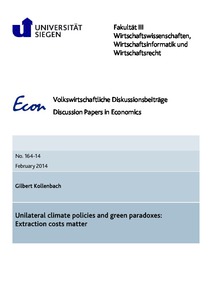Unilateral climate policies and green paradoxes: extraction costs matter
"Under which conditions unilateral tightening of climate policy causes a weak or strong green paradox or even decreases social welfare has recently been studied by Hoel (2011). Hoel assumes that the costs of extracting fossil fuel are linear in output. We extend his model by allowing for progre...
| Main Author: | |
|---|---|
| Institution: | ETUI-European Trade Union Institute |
| Format: | TEXT |
| Language: | English |
| Published: |
Siegen
2014
Universität Siegen |
| Subjects: | |
| Online Access: | https://www.labourline.org/KENTIKA-19110678124919388509-unilateral-climate-policies-an.htm |
| Summary: | "Under which conditions unilateral tightening of climate policy causes a weak or strong green paradox or even decreases social welfare has recently been studied by Hoel (2011). Hoel assumes that the costs of extracting fossil fuel are linear in output. We extend his model by allowing for progressively increasing and stock dependent extraction costs. Increasing unit costs imply the simultaneous utilization of fossil fuel and a clean backstop. This has a signicant effect on the results, as the utilization of backstop by the country which tightens its climate policy always prevents a weak green paradox. As a consequence, the effect of a tighter climate policy on social welfare can be reversed. Due to the stock dependence of extraction costs the amount of fossil fuel left in situ may be increased by a tighter climate policy. This implies that social welfare may increase, even if a weak green paradox occurs." |
|---|---|
| Physical Description: | 33 p. Digital |

